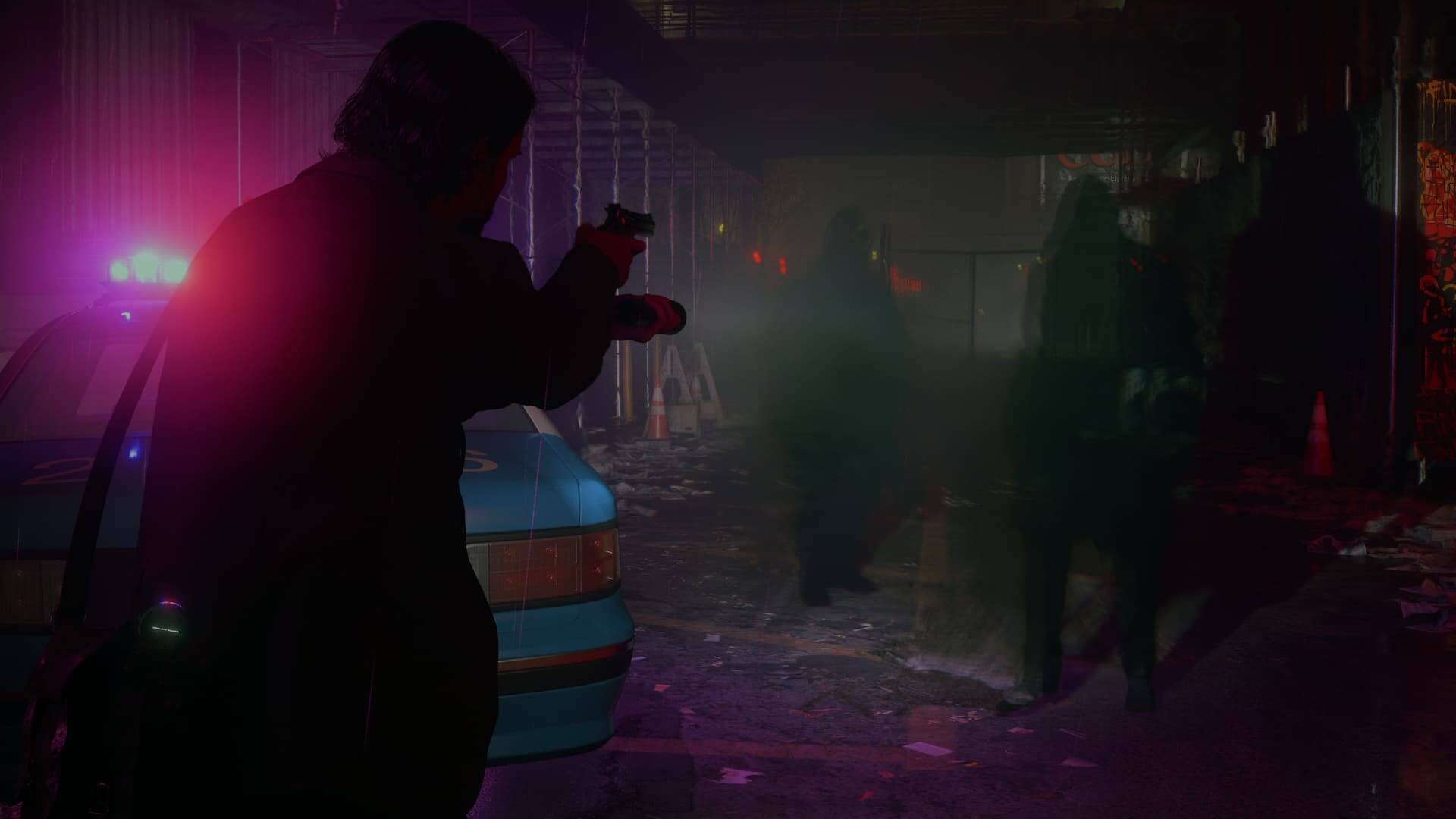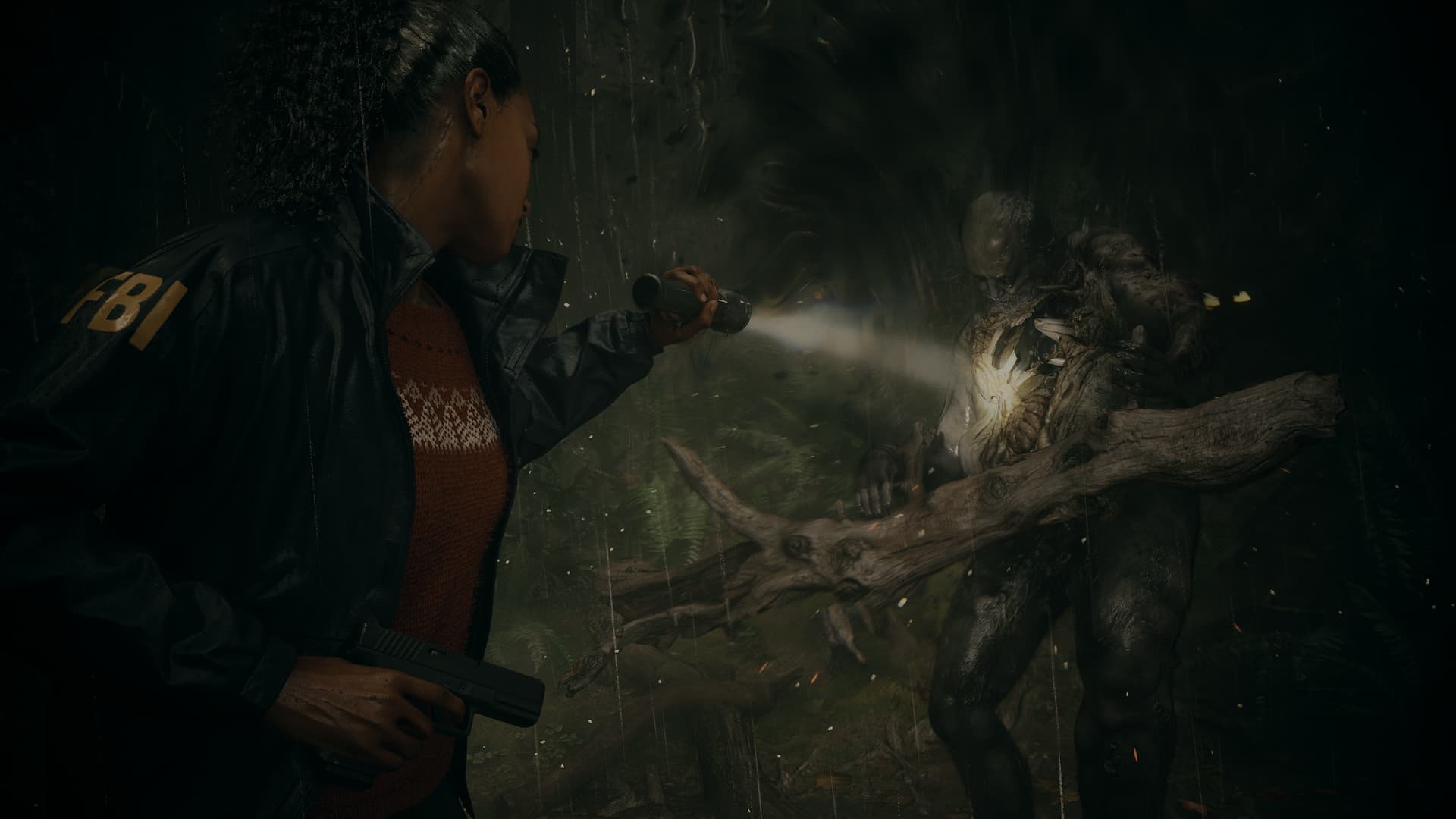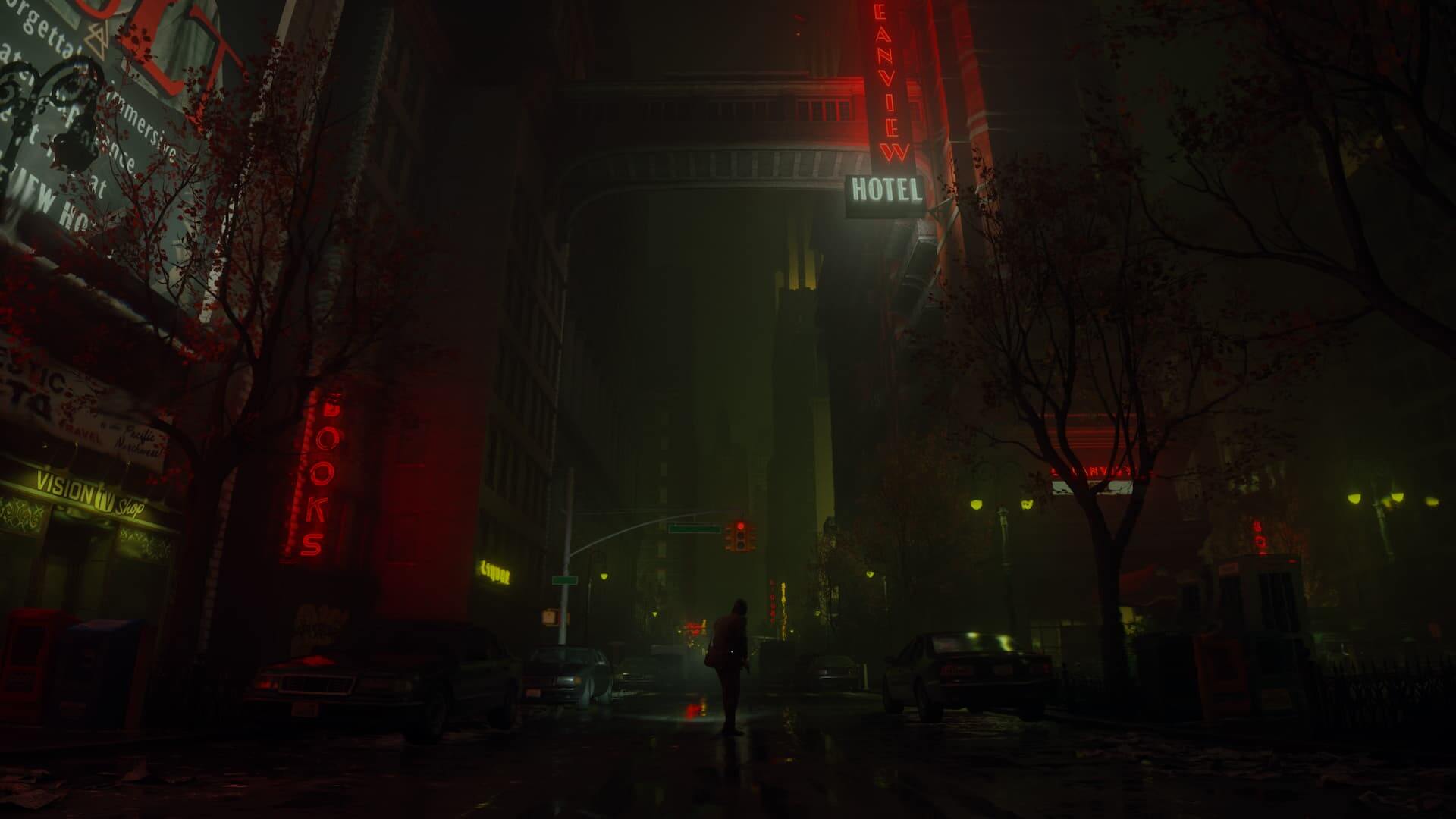Alan Wake II is Terrifying, but Not in the Way You Think
An unavoidable fear


Alan Wake II is one of the most unique and obscure AAA gaming experiences I've ever had. The story, the actors, the animation, the facial expressions, the graphical fidelity, the atmosphere – it's all undeniably top-notch. To top it all off, the game tries its hardest to be extremely scary and, for the most part, it succeeds.
The game details the process of someone losing their mind and becoming a Taken, accompanied by their dark disfigured silhouettes stalking the inky blackness of the Pacific Northwestern forests. We hear the last echoes of their humanity forcing themselves through distorted vocal cords as phrases said throughout their daily existence are repeated as if their mind has become an impossibly scratched vinyl with the needle forcefully digging itself deeper. We must face the idea that otherworldly powers can shape our reality down to the very recesses of your core being, making us believe – no, not believe, but know – that these fictional moments occurred in our real life, going as far as believing family or friends are dead and buried when they aren't. This is a rural town tucked away in the recesses of the mountains, cut off from the rest of the world, where residents are expected to just cope with the paranormal tragedies that befall them and understand that on any given day it could be them that goes missing, taken by the sinister figures in the plastic deer masks, from deep within the woods in the dead of night – it's all catastrophically unnerving.

We hear the last echoes of their humanity forcing themselves through distorted vocal cords...
With that being said, I am an old and grizzled gamer. I lived through the 2010-2015 YouTube days, where you couldn't go five minutes without seeing someone play Outlast, Amnesia: The Dark Decent, or Doki Doki Literature Club. I've played through PT dozens of times to see what scares were hidden away. Resident Evil and Dead Space are some of my favorite gaming franchises of all time. My love for horror games is a double-edged sword – on the one hand, I get to experience all of these incredible games and I have developed a massive appreciation for the hard work and vision of those who make these terrors a reality. On the other hand, it has hardened me to the point where very few games truly horrify me to my core. I've become too numb and can see the "game" through the horror easily enough that, if I'm not careful, the whole experience can sometimes feel a bit too "drama theater" for me. That's not to say that there hasn't been moments in recent years that have made me feel all kinds of uncomfortable (Resident Evil Village's Beneviento House was one of the most disturbing things I've seen in a game in a very long time) but these moments are rare.
When I started Alan Wake II, I was worried I was in for the same level of mild terror that most video games elicit in me nowadays. My fears were confirmed when the biggest form of tension were the effective (albeit a little bit cheap) static image jump scares that happen at certain points throughout the journey. Don't get me wrong, the game oozes with atmosphere and there is certainly tension and disquiet around essentially every corner, but like so many games before it, I never quite felt terrified.
That is until I reached the Valhalla Nursing Home.
Another reminder for spoilers here. If you haven't played Alan Wake II and you're thinking about it, please please please please go play it before you read ahead. I don't want to be a part of spoiling any of this mind-blowing experience. It deserves to be seen first-hand.
The Valhalla Nursing Home is a set piece that takes place late into Alan Wake II, and it gives a lot of context for one of the main protagonists, Saga Anderson. It confirms that her seemingly supernatural ability to see through peoples' lies and piece together clues is in fact paranormal in nature and that her lineage follows through the line of Tor and Odin (two major characters throughout the Alan Wake series.) It explains where the strange Alex Casey (Saga's partner) lunchboxes have been coming from, and who's been making the bizarre crochet ornaments that hang around them. The one thing it does best of all, however, is touch a cornerstone that so many human beings are fearful of and are poignantly aware that we cannot avoid: aging.
There are a few familiar faces calling the Valhalla Nursing facility their home, with two of the main standouts being local radio host Pat Maine and Lady of the Light Cynthia Weaver. Both of these individuals were present in the original Alan Wake, with Pat Maine's friendly tones floating over the airwaves as you make your way through Bright Falls, and Cynthia Weaver being instrumental in Alan defeating the Dark Presence by being the guardian of the Clicker, a device necessary to amplify the art that comes to life around Cauldron Lake.

I always really enjoyed hearing Pat Maine talk throughout the first game. He was like a beacon of levity and gravity in an otherworldly situation. No one who lives in Bright Falls seems to have their head on completely straight – likely due to the Dark Presence continuously oozing from the Lake – but Pat consistently lamented the strange goings-on and even chastised the FBI Agent Nightingale for his shoddy investigation work and penchant for alcohol-induced violence. You even get to have a few face-to-face interactions with Pat during Alan Wake's runtime, so despite being a secondary character, he leaves quite the impression.
Seeds are sown pretty early on in Alan Wake II showing that something is going on with Pat, as he is constantly confused during his radio show and seemingly gets information completely wrong. He states that townsfolk had talked to him recently despite the fact that they're actually dead, he doesn't heed the urgency of callers-in when they try to explain to him a local shootout has happened, and he even makes up an entire beef jerky company that he claims to be the sponsor of the radio show he's hosting. At first, it's framed as though this is a direct response to Pat's mind being altered by the Dark Presence. But after seeing the fate of Cynthia Weaver, I'm not so sure.
Cynthia Weaver played a vital role in the original Alan Wake. She was in love with Thomas Zane, the poet who went missing into Cauldron Lake in the 70s, so she's well aware of the situation plaguing Bright Falls. She is one of the only people in Bright Falls who understands what's going on, but without her, Alan Wake would have never gotten the Clicker and would have been unable to save his wife Alice from the Dark Place. When we meet Cynthia in the original game, she is a late middle-aged paranoid woman known for carrying a lantern everywhere she goes and having an irrational fear of darkness. She resides at the Bright Falls Dam where she has created a veritable fortress of light, with strings of bulbs running in every direction, keeping the Dark Presence at bay within every corner of her home. There she obsessively catalogues and changes each bulb, taking care never to miss one. The interactions with her seem to suggest that she's always been aware of the importance of her work, and she dutifully assists Alan in containing this dangerous paranormal phenomenon.
Alan Wake II takes place 13 years after the original, and age seems to have taken its toll on Cynthia. When Saga Anderson meets her inside Valhalla Nursing Home, she has been corrupted into a Taken. Despite all of her years of planning, despite all of her cautiousness and paranoia, in the end, she became the thing she so desperately tried to destroy. Not only is this tragic in its own right, but of all of the Taken throughout Alan Wake II, Cynthia is the most unnerving and stressful to go up against. Something about an old woman being corrupted beyond recognition is a familiar trope in horror, and it never fails to conjure deep feelings of discomfort. Cynthia is no different.
After a little investigation, the source of Cynthia's demise reveals itself. What was the catalyst for this terrible tragedy that befell someone who lived a lifetime of preparedness? Old age, plain and simple. It appears Cynthia's mental state was declining because of her age, if the journals and notes in her room are to be believed, and after all of her preparation, her downfall was ultimately the result of simply forgetting her lantern. This does appear to be the last straw in a long list of problems she had been having; her mental faculties being weakened by her age led her down a path to oblivion, as it does for so many of us here in the real world.

No one who lives in Bright Falls seems to have their head on completely straight.
With her beacon of light lost, and her mind weakened by the decay of age, the Dark Presence was able to take Cynthia one night during her bath, effectively winning the battle with her after all these years. While never explicitly stated, it feels as though this is an allegory for old age in general; no matter how prepared we are, no matter the precautions we take and the lives we live, no matter how healthy we are and how much we care, there is no stopping old age. Eventually, we will all lose that battle. Despite our best efforts, we will all lose our lanterns. It is an inevitability that humanity has struggled with for a long time, and seeing it personified within the story of Alan Wake II creates a feeling of deep-rooted, animalistic fear.
This also re-contextualizes the eccentric radio broadcasts made by Pat Maine throughout the sequel. Were they influenced by the Dark Presence leaking from Cauldron Lake like an infection, afflicting all of those who call Bright Falls home? Maybe, but more than likely poor Pat wasn't only succumbing to a malicious supernatural entity, he was also falling victim to something much more close to home. His misremembering of a neighbor's passing goes from a paranormal obstacle to a very normal one. Chances are, Pat just forgot that his neighbor had passed. The lack of reaction from a call stating that someone was killed in a shootout in his small town becomes a result of cognitive processing slowing down. The beef jerky company is a figment of an aging mind. Perhaps the Dark Presence exacerbated these symptoms, but I get the feeling that that doesn't tell the whole story.
The Valhalla Nursing Home section of Alan Wake II isn't all doom and gloom, however. The other residents living in the Home are shown as spry, witty, resilient, and full of life, even if their screen time is limited. It goes to show that, even in the darkest of places, the future can still be bright if we don't let it beat us down. There's always hope, regardless of how we feel in the moment. Getting older will happen to all of us, but for many, it means a beautiful life full of love, laughter, and the penultimate act of the human experience.
I'm not exactly terrified of getting older; my philosophy has always been that either you get older or you don't, and I would much rather have the opportunity to experience it than not. That being said, I feel as though the fear of aging is a deep-rooted part of the human experience. The way it is depicted in Remedy's masterpiece truly does hit that nerve in a way I don't think I've ever seen accomplished in gaming. It goes to show that storytelling within games has come a long way and that Alan Wake II really does deserve all the accolades it's gotten this year.
We are all destined to get older, and Alan Wake II makes that just a little more unnerving than it already is.
